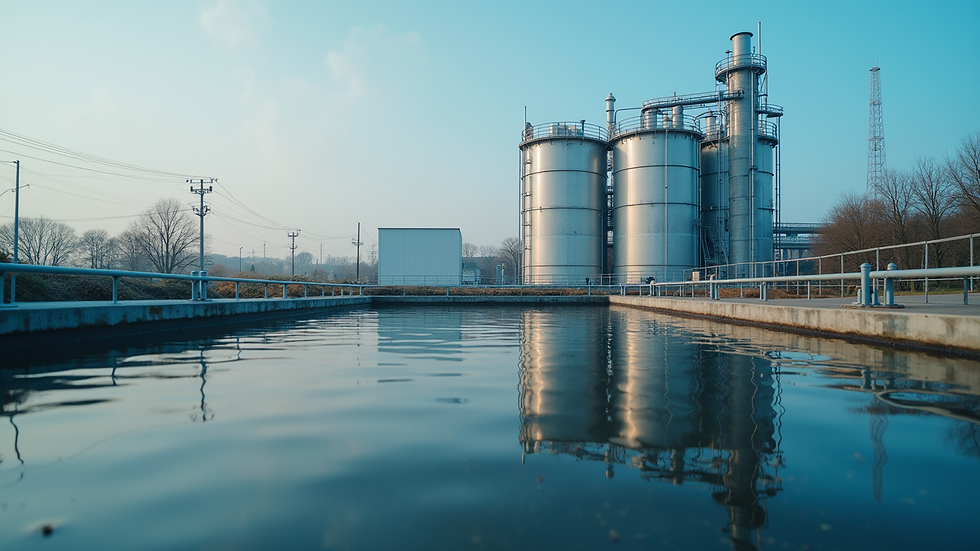Effective Techniques for Industrial Wastewater Management
- karan9377
- Aug 11, 2025
- 3 min read
Industrial wastewater is a significant environmental concern due to the pollutants it contains. Managing this wastewater effectively is crucial for protecting water resources, complying with regulations, and promoting sustainable industrial practices. This article explores various wastewater treatment techniques that industries can adopt to treat their effluents efficiently. By understanding these methods, industries can reduce their environmental footprint and contribute to a cleaner ecosystem.
Key Wastewater Treatment Techniques in Industry
Industries generate wastewater containing a mix of organic and inorganic substances, heavy metals, oils, and chemicals. Treating this wastewater requires a combination of physical, chemical, and biological processes. Here are some of the most effective wastewater treatment techniques used in industrial settings:
1. Physical Treatment Methods
Physical treatment is often the first step in wastewater management. It involves removing large solids and suspended particles through processes such as:
Screening: Removes large debris like plastics, rags, and other solids.
Sedimentation: Allows heavier particles to settle at the bottom of tanks.
Filtration: Uses sand or membrane filters to trap smaller particles.
These methods help reduce the load on subsequent treatment stages and improve overall efficiency.
2. Chemical Treatment Methods
Chemical treatment involves adding chemicals to neutralize or remove contaminants. Common chemical processes include:
Coagulation and Flocculation: Chemicals like alum or ferric chloride are added to clump fine particles into larger flocs, which can be easily removed.
Neutralization: Adjusts the pH of wastewater to a neutral level, protecting downstream biological processes.
Oxidation: Uses oxidizing agents such as chlorine or ozone to break down organic pollutants and disinfect the water.
Chemical treatments are particularly useful for removing heavy metals and toxic substances.
3. Biological Treatment Methods
Biological treatment uses microorganisms to degrade organic pollutants naturally. This method is cost-effective and environmentally friendly. The main biological processes include:
Activated Sludge Process: Aerobic bacteria consume organic matter in aeration tanks.
Trickling Filters: Wastewater passes over a bed of media where biofilms break down pollutants.
Anaerobic Digestion: Microorganisms break down organic matter in the absence of oxygen, producing biogas as a byproduct.
Biological treatment is essential for reducing biochemical oxygen demand (BOD) and chemical oxygen demand (COD) in wastewater.

4. Advanced Treatment Technologies
For industries with stringent discharge standards, advanced treatment technologies are necessary. These include:
Membrane Filtration: Techniques like ultrafiltration and reverse osmosis remove dissolved solids and pathogens.
Ion Exchange: Removes specific ions such as heavy metals from wastewater.
Electrochemical Treatment: Uses electric current to remove contaminants or recover valuable metals.
These technologies provide high-quality effluent suitable for reuse or safe discharge.
What is Industrial Water Management?
Industrial water management refers to the strategies and processes used to optimize water use and treat wastewater within industrial operations. It encompasses water sourcing, consumption reduction, wastewater treatment, and reuse. Effective industrial water management helps industries minimize water wastage, reduce environmental impact, and comply with regulatory requirements.
A comprehensive industrial water management plan includes:
Water Audits: Assessing water use and identifying areas for improvement.
Process Optimization: Modifying operations to reduce water consumption.
Wastewater Recycling: Treating and reusing wastewater within the facility.
Monitoring and Control: Using sensors and automation to manage water quality and flow.
Implementing these practices ensures sustainable water use and supports environmental stewardship.

Practical Recommendations for Implementing Wastewater Treatment
Industries looking to improve their wastewater treatment should consider the following actionable steps:
Conduct a Detailed Wastewater Characterization: Understand the composition and volume of wastewater to select appropriate treatment methods.
Combine Treatment Techniques: Use a multi-stage approach combining physical, chemical, and biological methods for optimal results.
Invest in Monitoring Systems: Real-time monitoring helps detect issues early and maintain compliance.
Train Staff: Ensure operators are knowledgeable about treatment processes and safety protocols.
Explore Water Reuse Opportunities: Treated wastewater can be reused for cooling, irrigation, or cleaning, reducing freshwater demand.
Partner with Experts: Collaborate with specialized companies for design, installation, and maintenance of treatment systems.
By following these recommendations, industries can enhance their wastewater treatment efficiency and sustainability.
The Role of Technology in Enhancing Wastewater Treatment
Technological advancements have revolutionized wastewater treatment, making processes more efficient and cost-effective. Some notable innovations include:
Automation and Control Systems: Automated valves, sensors, and software optimize treatment operations and reduce human error.
Artificial Intelligence (AI): AI algorithms predict treatment outcomes and optimize chemical dosing.
Nanotechnology: Nanomaterials improve filtration and contaminant removal.
Renewable Energy Integration: Solar and biogas energy reduce the carbon footprint of treatment plants.
Adopting these technologies can significantly improve the performance and sustainability of wastewater treatment systems.

Moving Forward with Sustainable Industrial Wastewater Management
Effective wastewater treatment is a critical component of sustainable industrial operations. By adopting a combination of proven techniques and innovative technologies, industries can manage their wastewater responsibly. This not only protects the environment but also enhances operational efficiency and regulatory compliance.
For industries seeking expert solutions, partnering with specialized providers in industrial wastewater management can offer tailored treatment systems and ongoing support. Embracing these practices ensures a cleaner future and a healthier planet for all.



Comments